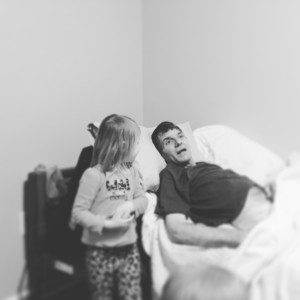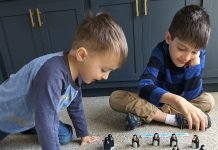Death is often times an uncomfortable subject, one that a lot of people don’t like to talk about. It’s inevitable – all living things die – but it doesn’t make it any easier to discuss or ponder. Explaining it to a young child makes it even harder.
My father-in-law, Roger, recently passed away after a long battle with dementia. Visiting Grandpa in a nursing home was all our daughters had ever known. When we showed up for a visit, the residents would light up at the sight of the girls. Some would tell us stories of their grown children during a lucid moment while others tried to scoop them up as their own under the fog of Alzheimer’s or whatever awful form of dementia they were fighting. The baby, too young to remember any of it, was leery of the strangers. At three years old, Gracyn ate it up. She would sing and dance and preform for Roger and his friends. She was a professional high-five giver, and he loved it even as he was slowly slipping away.
My husband and I knew what was coming. As caregivers and the ones in control of his estate, we planned as much as we could for Roger’s final days. We talked about death as a couple and it changed the way we talked about it with our friends and family, encouraging anyone who would listen to establish some sort of a plan before it was too late.
 One thing that kind of snuck up on us, though, was how we were going to actually explain death to our daughter in a way she’d understand. To be honest, I actually thought she was too young to really get it. Google told me to stay away from words like sleep, gone, away, and lost and to explain things in simple, concrete terms.
One thing that kind of snuck up on us, though, was how we were going to actually explain death to our daughter in a way she’d understand. To be honest, I actually thought she was too young to really get it. Google told me to stay away from words like sleep, gone, away, and lost and to explain things in simple, concrete terms.
We explained that Grandpa had been sick for a really long time and that his doctors were doing everything they could to make him better. When he passed away, we used the words “he died,” explained that his body stopped working and that we wouldn’t be able to see him anymore. We also made sure she understood it was OK to be sad about it but we would always continue to talk about Grandpa, tell stories and remember the time we had together.
Again, I wasn’t so sure it clicked with her at first, but in the days leading up to Roger’s funeral, Gracyn asked about what happened on several occasions. Now, two months later, she will mention it in passing or if she hears us talking about him.
I found this article very helpful after a fellow KCMB contributor passed it along. It gives examples of how to depict certain illnesses and discuss different types of death. This document explains how children process and understand death based on their age, which is also helpful if you need an additional resource.
She has yet to ask what would happen if I were to die or if she will die some day but I know those questions will come. By starting the conversation early, and because she unfortunately had to experience a death in family at such a young age, my hope is that she isn’t afraid to ask those questions.

















